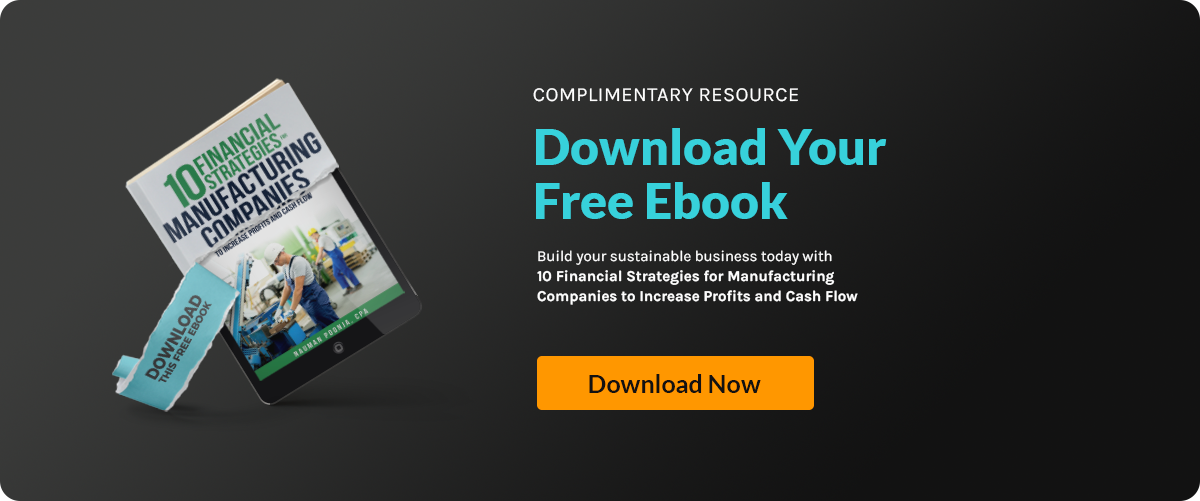Manufacturing owners live in a world of thin margins, tight schedules, and nonstop decisions about...
Fractional CFOs in Manufacturing: Strategic Finance Without the Overhead

In the fast-paced, margin-sensitive world of manufacturing, the need for real-time financial oversight, accurate costing, and investment discipline is non-negotiable. Managing a manufacturing business goes far beyond crunching numbers—it’s about keeping costs in check, optimizing production lines, and safeguarding profitability at every turn. Each financial decision, from how you value inventory to how you handle labor and material costs, has a direct impact on your bottom line.
With today’s relentless supply chain disruptions, rising input costs, and persistent labor shortages, having the right financial expertise isn’t just helpful—it’s essential. Yet for many manufacturers, there’s a tricky balancing act between getting the financial insight you need and the steep price tag of a full-time CFO with deep industry know-how. However, not every business is ready for—or needs—a full-time CFO.
That’s where an expert fractional manufacturing CFO comes in.
More than a part-time executive, this role blends deep operational understanding with strategic financial leadership. Let’s unpack what this professional brings to the table and how it can reshape your manufacturing performance.
Operational Finance Expertise That Goes Beyond Accounting
A specialized fractional CFO doesn’t stop at the balance sheet. They dive into:
- Cost drivers at the floor level – analyzing labor efficiency, raw material usage, equipment uptime, and overhead allocations
- Inventory turns and waste management – finding opportunities to reduce excess and scrap.
- Real-time KPI dashboards – aligning production metrics with financial performance
Unlocking Visibility With Tailored Manufacturing Dashboards
A well-built manufacturing KPI dashboard is your command center for tracking what matters most, all in real time. By designing dashboards customized to your shop floor and business model, you can spotlight the right financial and operational health indicators at a glance—no more sifting through spreadsheets after the fact.
Metrics to consider anchoring on your dashboard often include:
- Throughput and yield rates – How efficiently are your lines producing finished goods?
- Downtime vs. uptime – Where is production routinely stalling, and how fast are you getting back online?
- Gross margin by SKU or job – Which products or customer contracts are truly pulling their weight?
- Inventory turns and stockouts – Keeping just enough raw materials at the right time, not excess sitting idle.
- On-time delivery and order accuracy – Are you meeting customer promises and minimizing costly returns or rework?
Whether built in Power BI, Syft, or Excel, these tailored KPIs transform opaque operations into actionable daily insight. You’ll spot bottlenecks, optimize resource allocation, and make confident decisions before issues hit the bottom line.
This operational alignment transforms finance from a reactive reporting function into a proactive decision-making asset.
The Power of a Collaborative Financial Team
A team-based approach—combining bookkeepers, controllers, and CFOs—offers manufacturers something a single hire rarely can: adaptability and depth, all under one roof.
Rather than relying on one overworked individual to juggle every spreadsheet and high-level strategy, this model matches each financial need with the right specialist at the right time:
- Bookkeepers handle day-to-day transactions, ensuring accuracy and consistency from the ground up.
- Controllers provide robust oversight, tightening internal controls, managing compliance, and preparing actionable reports.
- CFOs drive strategic decision-making, connecting financial data to growth planning and operational improvements.
The result? No missed details, no bottlenecks—and your organization always receives the right level of expertise, precisely when it’s needed most. Even better, this structure scales as your company grows, delivering predictable costs and peace of mind for manufacturers navigating both steady operations and sudden surges.
Strategic Insights Without Full-Time Overhead
Hiring a full-time CFO may not be practical, especially for mid-sized manufacturers or those scaling fast. A fractional CFO brings senior expertise on a flexible schedule. Their typical contributions include:
- Rolling forecasts based on capacity and demand fluctuations
- Profitability analysis across product lines and customer segments
- Capital planning for new equipment or facility expansions
- Building financial fluency within plant and leadership teams
You get high-impact insights without the long-term commitment or cost of a full-time executive.
Cost of Full-Time CFO Leadership Backed by Industry Benchmarks
According to Glassdoor, the annual salary for a full-time manufacturing CFO typically ranges from $254,000 to $466,000—a significant investment for any organization. In contrast, a fractional CFO delivers the same high-caliber expertise and strategic impact, but at a fraction of the cost and without the burden of full-time executive compensation. This means you can access seasoned financial leadership precisely when you need it, freeing up capital for other critical investments on the shop floor.
Key Deliverables You Can Expect
When you bring in a specialized fractional manufacturing CFO, the deliverables go far beyond traditional financial statements. Expect tools and frameworks that improve visibility and decision-making:
- Plant-specific P&L dashboards with real-time tracking
- Variance analysis reports linked to production shifts and inputs
- Refined standard costing systems integrated with ERP tools
- Working capital optimization models for inventory and cash flow
- Custom KPI scorecards tailored to your factory’s operations
- CapEx ROI models with scenario planning
These outputs become essential tools for both the finance team and floor leadership.
Proactive Short-Term Cash Flow Management
Staying ahead of cash flow crunches in manufacturing requires more than gut instinct—it takes anticipatory tools designed for factory realities. Fractional CFOs deploy focused short-term cash management methods, the most tried-and-true being the 13-week cash flow projection.
This rolling forecast looks ahead quarter by quarter, mapping out inflows from customer receivables alongside outflows for raw material purchases, production costs, and payroll obligations. By linking these projections directly to your production schedule, purchasing cycles, and payment terms, you gain a real-time view of potential gaps—before they happen.
Key advantages include:
- Early warning on cash shortages—avoid frantic calls to the bank or urgent expense cuts
- Visibility into timing of large outlays—like bulk inventory orders or equipment payments
- Improved vendor relationships—plan payments strategically to preserve terms and trust
For manufacturers using platforms like QuickBooks or advanced ERP systems, these projections can be integrated for seamless updates, keeping leadership agile and informed. It’s the essential antidote to “surprise” cash crunches in a business where timing is everything.
Costing Systems That Actually Work
Many manufacturers struggle with outdated or inaccurate standard costing. A fractional CFO can revamp these systems by:
- Establishing accurate standard costs based on current processes
- Implementing real-time variance analysis
- Integrating costing into ERP systems for live visibility
This allows plant managers to understand where money is made—or lost—on a daily basis.
Guiding CapEx with Financial Discipline
Equipment investments can easily stall if ROI is unclear or financing is murky. A specialized CFO helps structure capital allocation decisions by:
- Modeling return scenarios on new machinery or automation
- Comparing lease vs. buy decisions
- Stress-testing assumptions against production forecasts
The result: smarter growth investments, grounded in data.
Strategic CFO-Level Projects and Expertise
Beyond routine financial management, fractional CFOs often lead major strategic initiatives:
- ERP implementation leadership with financial alignment
- M&A transaction support from financial modeling to due diligence
- Private equity and investor readiness through professional-grade financial packages
- Cross-functional cost reduction initiatives across procurement, labor, and logistics
- Sustainability and ESG reporting frameworks tied to operations
These high-stakes projects require the financial precision and strategic lens a seasoned CFO brings—without needing one full time.
Building Scalable Financial Infrastructure
Beyond quick wins, fractional CFOs help manufacturers prepare for scale. This includes:
- Designing reporting packages that support multi-plant operations
- Structuring systems for bank/lender readiness
- Supporting leadership through M&A due diligence or private equity reviews
Whether you’re preparing for expansion or an eventual exit, they ensure your financial story is both accurate and compelling.
When Is the Right Time to Engage?
You might be ready for a fractional CFO if:
- Your gross margins are tight and unclear
- You’re adding new product lines or facilities
- You’re preparing for a strategic exit or investment
- Your ERP isn’t giving the clarity you need
- You need a financial partner who speaks both numbers and operations (
Final Thought
A specialized fractional manufacturing CFO isn’t just a numbers person—they’re a manufacturing-savvy strategist who helps you unlock margin, streamline operations, and make informed growth moves.
Bringing one into your business means you’re serious about translating operational complexity into financial clarity. If that’s where you’re headed, it might be time to start the conversation.







.jpg?height=200&name=iStock-527045000%20(1).jpg)